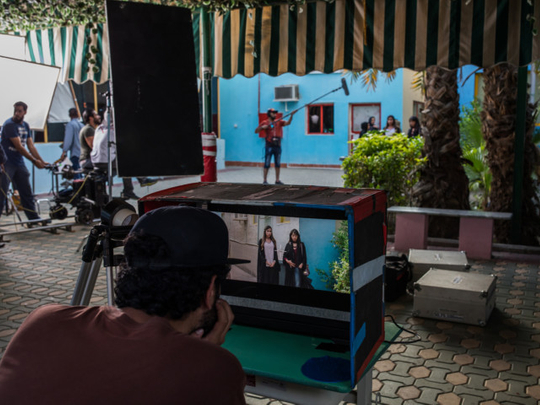
Riyadh: The Saudi government has recently become a patron of the arts, sponsoring concerts by Western performers such as New Age artist Yanni and promoting comic festivals and book fairs. Cinemas, banned for decades, are set to open soon.
The thaw is part of a push by Saudi Arabia’s 32-year-old crown prince, Mohammad Bin Salman, to ease some social restrictions, and the flurry of official announcements has thrilled a generation of young Saudis for whom a night of music or movies most often meant trips abroad.
A focus on entertainment and culture is central to a plan to diversify the country’s oil-dependent economy while expanding some social freedoms.
Saudi officials and the crown prince’s supporters say the changes - including allowing women to drive (a concession promised by the late King Abdullah) and curbing the authority of the “religious police” - represent a long-delayed effort to drag the kingdom into the modern era.
Some initiatives, such as the opening of cinemas, have also promised a vast economic opportunity.
In embracing the arts, the Saudi leadership drew a lesson in image-making from its ally and neighbor, the United Arab Emirates, which long ago recognised that its homegrown cultural scene was also a “powerful tool of soft power and diplomacy,” said Beth Derderian, a doctoral candidate in anthropology at Northwestern University who studies the development of arts and culture in the UAE.
“We say, ‘In movement, there is a blessing,’ “ said Mohammad Hafiz, co-founder of Athr, a contemporary gallery that opened in Riyadh in 2009, who has advised the government on its foray into culture.
He said officials are approaching the arts as a “holistic ecosystem” of theatres, museums, auction houses and other venues that would bolster arts education and nurture an embrace of art in society at large.
One of the most ambitious projects, the King Abdul Aziz Centre for World Culture, features a library and museum, and recently launched a competition to promote contemporary Saudi artists.
And critically, he said, the government is consulting local artists as it moves forward - among them Ahmad Mater, one of Saudi Arabia’s best-known contemporary artists, whose work, including large-scale photographs, videos and installations, is being shown at the Brooklyn Museum.
There was bound to be a period of “trial and error,” Hafiz acknowledged.
But, he said, “you stay still and nothing happens . . . The whole society is moving much faster than it was before.”
Among young artists, a sense of possibility has taken hold.
Nada Al Mojadedi, a filmmaker, said it would take time take for Saudi audiences to embrace local content.
They “haven’t been accustomed to watching stories about themselves,” she said. But the government’s encouragement - or at least its endorsement of cultural events - has been a boon, she added.
Her short film, called “Zaina’s Cake,” was screened at a film festival sponsored by the Saudi oil company Aramco last spring that was attended by filmmakers from across the country, she said. During one recent week, it played at film nights in Riyadh and the eastern city of Dammam.
Khalid Nadershah, a 26-year old filmmaker shooting his first feature in Saudi Arabia, praised the plans to open cinemas and support filmmakers as encouraging first steps.
“People need to see that there is such a thing as Saudi movies and that the industry is real,” he said.
Already there is evidence that attitudes toward artists are changing, as bureaucratic barriers have tumbled: His permits to film on the streets of the city of Jeddah had taken only a week to come through, Nadershah said.
Nadershah’s ambition is broad - to tell “all the untold stories about my culture and society,” he said.
His is a small, self-financed film called “Exit 5,” about a divorced woman struggling to get her parents’ approval to study abroad.
“A very common problem,” he added.
He is less concerned with negotiating social taboos than with the challenge of finding a platform for an independent film. New cinemas are opening, but the Saudi audience that will fill the seats is largely obsessed with US mainstream entertainment, he said.
“There is a new wave of artists trying to find a Saudi popular culture,” he said.
“It’s so inspiring. But I can’t say we are quite there yet.”










